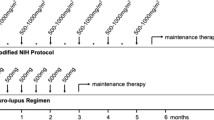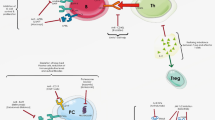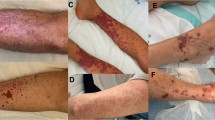Abstract
There is increasing interest in rituximab (RTX) as an alternative to cyclophosphamide (CYC) for remission induction in systemic vasculitis. Recent studies have reported high remission rates, but it is not clear how long the initial remission lasts [1, 2]. A retrospective study was undertaken of 15 cases of refractory systemic vasculitis (11 Wegener's granulomatosis, 1 Churg–Strauss syndrome, 1 cutaneous polyarteritis nodosa and 2 cryoglobulinaemic vasculitis) treated with RTX, with a mean follow-up of 34 months. All had previously received CYC, and 14, at least one other immunosuppressive drug. All had active disease when treated (median Birmingham Vasculitis Activity Score (BVAS) 2003, 13). All cases achieved remission (BVAS 2003, 0). Thirteen required re-treatment, nine due to relapse (mean, 9 months after initial treatment) and four because of repopulation or rising ANCA in the context of CYC intolerance or previous CYC refractory disease. Relapsing cases have been successfully re-treated up to five further cycles, either at B cell repopulation or at six monthly intervals. Infections were rare. Mean IgG levels fell significantly, and IgM levels became subnormal in six cases. There were three cases of neutropenia, one severe at 10 months post-treatment. These results provide further evidence that RTX is an effective induction agent in systemic vasculitis. The optimal and long-term outcome of re-treatment remains to be defined.

Similar content being viewed by others
References
Keogh KA, Ytterberg SR, Fervenza FC, Carlson KA, Schroeder DR, Specks U (2006) Rituximab for refractory Wegener's granulomatosis: report of a prospective, open-label pilot trial. Am J Respir Crit Care Med 173:180–187
Keogh K, Wylam M, Stone J, Specks U (2005) Induction of remission by B lymphocyte depletion in eleven cases with refractory antineutrophil cytoplasmic antibody-associated vasculitis. Arthritis Rheum 52(1):262–268
Stone J, Merkel P, Spiera R, Seo P, Langford C et al (2010) Rituximab versus cyclophosphamide for ANCA-associated vasculitis. N Engl J Med 363:221–232
Jones R, Cohen Tervaert J, Hauser T, Luqmani R, Morgan M, Peh C et al (2010) The European Vasculitis Study Group. Rituximab versus cyclophosphamide in ANCA-associated renal vasculitis. N Engl J Med 363:211–220
Lovric S, Erdbruegger U, Kumpers P et al (2009) Rituximab as rescue therapy in anti-neutrophil cytoplasmic antibody-associated vasculitis: a single-centre experience with 15 cases. Nephrol Dial Transplant 24:179–185
Jones RB, Ferraro AJ, Chaudhry et al (2009) A multicenter survey of rituximab therapy for refractory antineutrophil cytoplasmic antibody-associated vasculitis. Arthritis Rheum 60(7):2156–2168
Stasi R, Stipa E, Del Poeta G, Amadori S, Newland AC, Provan D (2006) Long term observation of cases with anti-neutophil cytoplasmic antibody-associated vasculitis treated with rituximab. Rheumatology 45(11):1432–1436
Aries PM, Hellmich B, Voswinkel J, Both M, Noelle B, Holl-Ulrich K et al (2006) Lack of efficacy of Rituximab in Wegener's granulomatosis with refractory granulomatous manifestations. Ann Rheum Dis 65:853–858
Martinez Del Pero M, Chaudhry A, Jones R, Sivasothy P, Jani P, Jayne D (2009) B-cell depletion with rituximab for refractory head and neck Wegener's granulomatosis: a cohort study. Clin Otolaryngol 34:328–335
Tamura N, Matsudaira R, Hirashima M, Ikeda M, Tajima M, Nawata N et al (2007) Two cases of refractory Wegener's granulomatosis successfully treated with rituximab. Intern Med 46(7):409–414
Eriksson P (2005) Nine patients with anti-neutrophil cytoplasmic antibody-positive vasculitis successfully treated with rituximab. J Intern Med 257(6):540–548
Taylor SR, Salama AD, Joshi L, Pusey CD, Lightman SL (2009) Rituximab is effective in the treatment of refractory ophthalmic Wegener's granulomatosis. Arthritis Rheum 60(5):1540–1547
Jennette JC, Falk RJ, Andrassy K et al (1994) Nomenclature of systemic vasculitides: the proposal of an international consensus conference. Arthritis Rheum 37:187–192
Flossmann O, Bacon P, de Groot K, Jayne D, Rasmussen N, Seo P, Westman K, Luqmani R (2007) Development of comprehensive disease assessment in systemic vasculitis. Ann Rheum Dis 66(3):283–292
Acknowledgements
None.
Disclosures
None
Funding
None
Author information
Authors and Affiliations
Corresponding author
Rights and permissions
About this article
Cite this article
Rees, F., Yazdani, R. & Lanyon, P. Long-term follow-up of different refractory systemic vasculitides treated with rituximab. Clin Rheumatol 30, 1241–1245 (2011). https://doi.org/10.1007/s10067-011-1756-8
Received:
Revised:
Accepted:
Published:
Issue Date:
DOI: https://doi.org/10.1007/s10067-011-1756-8




